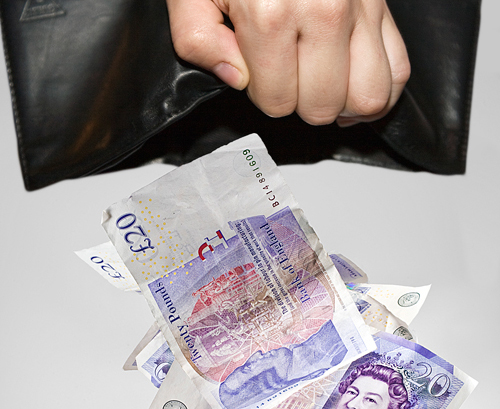We are bombarded by daily reports of weakening markets, probable recession and ominous forecasts of the future economic climate, and many of us feel drowned in jargon and confusion. What on earth does it mean, how did it all start, and how does it affect me?

Dr Gerry Strange, Reader in Political Economy at the University of Lincoln, believes that the problems we currently face have been triggered by a lack of controls over the financial markets; “The current economic crisis is rooted in the comprehensive deregulation of capital and other markets which has been pursued as ideologically informed policy by neoliberal governments throughout the world over the past 30 years. Apart from other issues, this deregulation made possible an enormous expansion of private credit.
The stability of capitalist economies is dependent on the capacity to expand the market for goods and services as a means to profitability. Credit is a way of providing people on limited income with the means to buy the goods and services or other resources on which profit depends.” Basically, everyone needs to be spending money for us to sustain a healthy economy. The only problem is, not everyone could afford to continuously spend.
So, the banks offer credit. This stimulates spending amongst the public in a ‘buy now, pay later’ style. Another issue with this is the offering of credit to those who can’t afford to pay back. This is particularly true to the U.S housing market. ‘Sub-prime mortgages’ (high risk lending) were popular amongst U.S banks as, initially, house prices increased.
They believed that this rise would continue. The banks then borrowed to lend. The rise didn’t continue and as inflation worsened, interest rates increased. The high-risk borrowers were unable to meet payments hurling them in to financial chaos. The banks who lent out to these people made huge losses, so became increasingly unwilling to offer credit. Limited credit, limited spending, suffering economy. This lack of credit is how the term ‘credit crunch’ was coined.

Dr Strange also predicts that we will all feel the slump; “Some will feel the crisis more dramatically and immediately than others, but in the end everyone, bar the bankers who have withdrawn their money into private hoards of gold, property, cheap real estate, luxury spending, etc rather than risk investment, will be affected.
For example, the collapse of the mortgage market affects the homeless, home-owners, estate agents, surveyors, building contractors, builders, etc. It also affects retailers who will see the demand for expensive domestic goods – kitchens, furnishing, etc, dramatically fall. Ultimately, everyone is affected because everyone’s employment is dependent on the income of somebody else. And the crisis means that income is falling.”
So what about the future? It’s becoming increasingly obvious to economists that we will enter a recession – if we aren’t already in the grasp of one. The question now is how bad will it be? And what can we do to dampen the effects? The government just announced plans to re-capitalise banks in a deal costing the tax-payer £50 billion. This is aimed at freeing up some lending capacity, in the hope that more credit will be available, thus increasing spending within the economy.
Dr Strange highlights the knock on effects of a government bail-out; “The huge government bail-outs of the private financial sector is the start, not the end, of the crisis. If the government is to avoid the real possibility of an inflationary crisis, i.e. if it simply prints more money to spend its way out of crisis, then it must fund this bail-out through increasing taxes, diverting existing expenditure or, paradoxically, borrowing from the same markets it is currently servicing as lender of last resort. As government borrowing and the national debt increases, government spending will have to be cut, taxes on Joe-public will have to increase and interest rates will have to rise.
Without a fundamental shift in the system the future is looking bleak. The Great Depression, which followed the Wall Street Crash in 1929 led to a collapse in employment, output and income, which in the case of the United States took almost 30 years to reverse.”

I would point out that if the government borrows money from the wholesale market to lend on to the banks it has not actually increased its net debt (there is an increase in debt and assets). This is fine as long as the banks that it has lent to can repay the money eventually, so what the government has actually taken on is risk.
There is also the chance that the government may make money on the capital injections vis preference and ordinary shares. I am less confident of this than I was though!